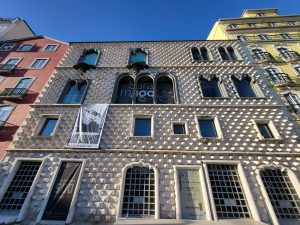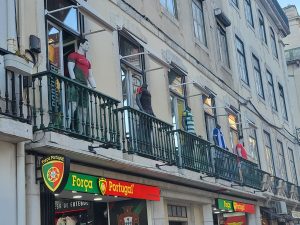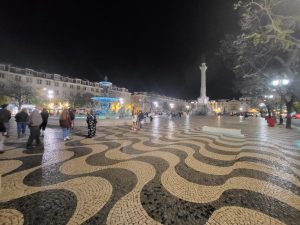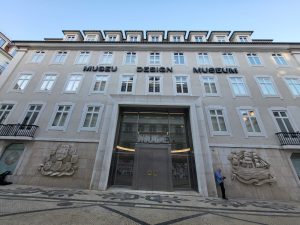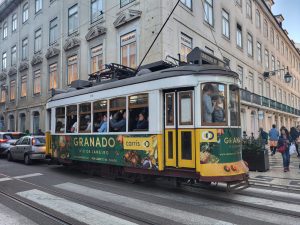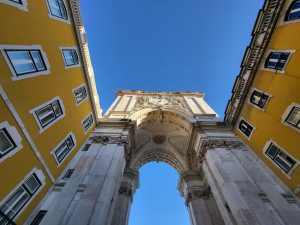ALBERTO BARCIELA
LISBON, COSMOPOLITAN LIGHT

Apparently, the only thing we see of the city is what the city shows us. Lisbon is translucent, it gives itself all in its generous attitude for those who are predisposed to admire it, for those who open their arms in order to embrace a small cosmopolitan universe, structured, beautiful, as if it emerged from an explicit order, allowed by a catastrophe from which the city knew how to rebuild itself from its own ashes, from its rubble, more flirtatious and stately, in an evolutionary process of justified pride that has been going on since 1755.
Lisbon resembles the work of “calceteiros”, those artisans of stone filigree, which is art in which each piece fits into an urban puzzle subjected to design, to the vicissitudes. The ground is admired illuminated by the iodized light of the Tagus that becomes immense, Atlantic, a river that indicated all directions to the seasoned sailors who became discoverers, conquerors, propagators of a faith and a beautiful language.
In Lisbon one walks on a catalog raisonné of the work of thousands of anonymous authors. Streets, squares, port, riverside, are combined in an orderly succession, observable from its gentle hills with vestiges of that splendid past, credulous but credible, of a monarchy that has known how to grow into a republic. Then the limit was in the audacity of a court ambitious of horizons, capable of scanning worlds, of spinning empires, of scanning the seas with their islands, of bending capes and of naming Africa, Asia or America with the blessings of a saint’s day of hopes, which reached sardine fishermen, adventurers and traders, religious and the monarchs themselves. All ready to discover an innate species of new worldly aromas. Part of the global was born in Lisbon, adjusted to the demands of each time, to the advances for a nation that was world, the first global conscious of History, of a country that knew how to rebuild itself from the destruction of an earth tremor, a tsunami and a fire, devastating, of a country in which weapons flourished forever, on April 25, 50 years ago.
In the Portuguese capital, the scent of saltpeter mingles with the sweet perfume of traditional pastries, creating a symphony of smells that intoxicates the senses of those who wander through the narrow cobblestone streets. Each facade has centuries of stories engraved on its walls, with the incredible Hotel Aurea Museum, or in its tiles that tell tales of forgotten times that intertwine with the modernity and vitality of a city desirable for tourists who stay forever. And the river meanders calmly, a silent witness of the grandeur and melancholy that permeates the soul of Lisbon.
Streetcars zigzag along the steep slopes, carrying with them the bustle of a city that whispers its secrets among hidden corners and lifts itself to its delightfully blue skies. Cafés with tradition host endless gatherings where the voices of locals and travelers intermingle, creating a cozy atmosphere full of warmth. On every corner, the saudade is palpable, that melancholic nostalgia that envelops the Lisbon spirit and drives it to embrace life with passion and authenticity, honoring its roots and looking to the future with determination. Lisbon, a city that invites you to get lost in its labyrinthine streets, in its wonderful museums, such as the Calouste Gulbenkian, the Fado Museum or the MUDE – Design Museum, in its delightful restaurants, in its charming stores, and to discover the magic that hides behind every half-open door, like the kind soul of its welcoming citizens. A carnation and a smile, today the people evoke the most beautiful revolution, “O povo é quem mais ordena” “…na terra da fraternidade”, in the world capital of kindness and gentleness.
Lisbon is a cosmopolitan city that shows itself as it is: historical, young, lively, cultural, poetic, charming, melancholic, musical, sunny, traditional, authentic, welcoming, that is why it is the desired and much loved capital of “… , o Reino Lusitano,” or the Lusitanian Kingdom. o Reino Lusitano, …. onde a terra se acaba e o mar comença”, according to Luís de Camões.
————
ALBERTO BARCIELA, Spanish journalist, is vice-president of EditoRed.
This text is free to use. If you use it, please cite the author and EditoRed.
Images by Alberto Barciela
